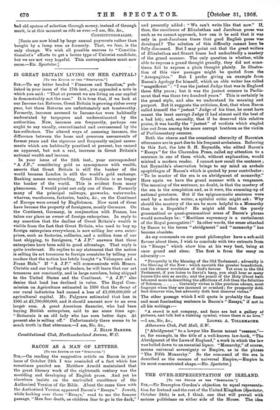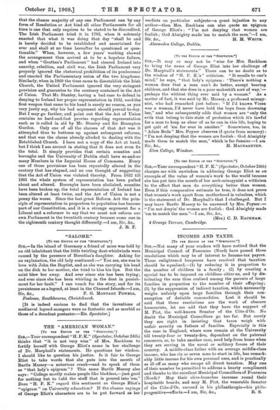THE OVER-REPRESENTATION OF IRELAND.
[TO THE EDITOR OF THE "SPECTATOR:1
Stu,—Sir Brampton Gurdon'e objection to equal representa- tion for Ireland and the rest of the United Kingdom (Spectator, October 24th) is not, I think, one that will prevail with serious politicians on either side of the House. The idea that the chance majority of any one Parliament can by any form of Resolution or Act bind all other Parliaments for all time is one that only requires to be stated to be discredited. The Irish Parliament tried it in 1783, when it solemnly enacted that what it was doing that day "shall be and is hereby decided to be established and ascertained for ever and shall at no time hereafter be questioned or ques- tionable." When, however, a few years' working showed the arrangement then arrived at to be a hopeless failure, and when " Grattan's Parliament" had steered Ireland into anarchy, rebellion, and civil war, the Irish Parliament very properly ignored the rhetorical prohibition of its predecessor and enacted the Parliamentary union of the two kingdoms. Similarly, when in 1869 the time came to disestablish the Irish Church, the United Parliament ignored the very stringent provision and guarantee to the contrary contained in the Act of Union. That Mr. Stanley, having a bad case to defend in denying to Ireland her proper representation in 1832, used the first weapon that came to his hand is surely no reason, as you very justly say, why his bad argument should prevail to-day. But I may go further, and point out that the Act of Union contains no hard-and-fast proviso regarding representation such as is called in aid by Mr. Stanley and Sir Brampton GurclOn. Only one of all the clauses of that Act was it attempted thus to buttress up against subsequent reforms, and that was the clause already alluded to dealing with the Established Church. I have not a copy of the Act at hand, but I think I am correct in stating that it does not even fix the total. It simply provides that certain counties and boroughs and the University of Dublin shall have so-and-so many Members in the Imperial House of Commons. Every one of those provisions has been repeatedly altered in the century that has elapsed, and no one thought of suggesting that the Act of Union was violated thereby. From 1832 till 1885 the whole system of representation has been pulled about and altered. Boroughs have been abolished, counties have been broken up, the total representation of Ireland has been altered at least twice, and the Act of Union is not a penny the worse. Since the last great Reform Act the prin- ciple of representation in proportion to population has become part of our Constitution, and it is a strange argument for a Liberal and a reformer to say that we must not reform our own Parliament in the twentieth century because some one in the eighteenth century thought differently.—I am, Sir, &c.,
J. R. F.















































 Previous page
Previous page